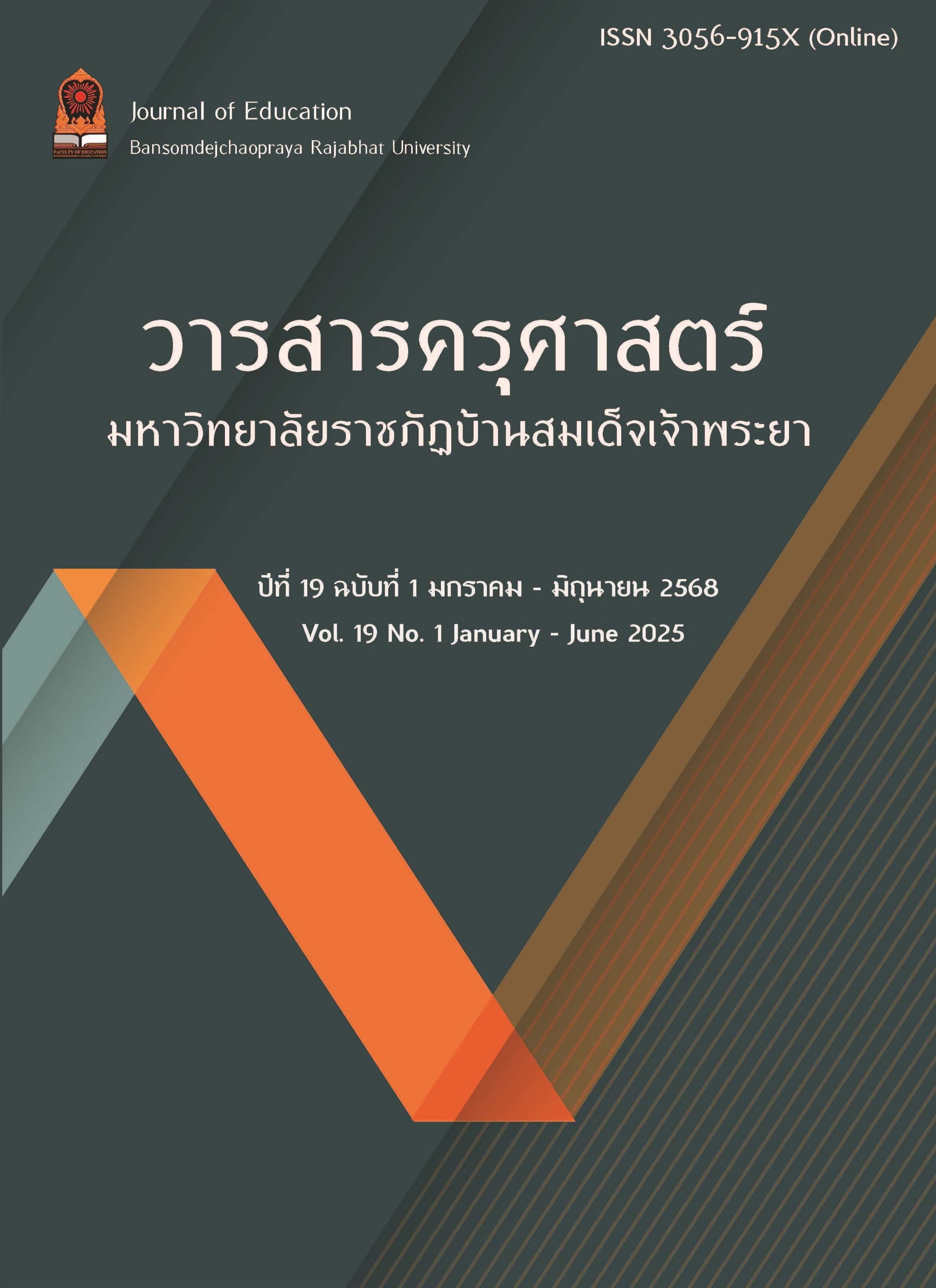Guidelines for Developing Strategic School Administrators and Knowledge Management for Organizational Management under the Sufficiency Economy Philosophy
Keywords:
educational administrators, strategic, creativity, organizational management, sufficiency economy philosophyAbstract
This research aimed to study the strategic development approach for educational institution administrators for organizational management under the philosophy of sufficiency economy, consisting of the following 4 issues: 1) holistic development of executive potential, 2) digital competence, 3) happy organization management, and 4) the principle of sufficiency economy. The population of this research was 50 executives of the Faculty of Education, Bansomdejchaopraya Rajabhat University, selected by purposive sampling, and the interview group consisted of 10 executives and 40 lecturers. The research instruments were document analysis, questionnaires with a reliability of 0.87 divided into 4 areas, structured interviews, and evaluation forms. The statistics used in data analysis were percentage, mean, and standard deviation.
The results of the research found that the strategic development approach for educational institution administrators for organizational management under the philosophy of sufficiency economy in all 4 areas is currently at a high level. When considering the results of the research in this area from highest to lowest level, they are as follows: The highest level is holistic development of executive potential, followed by digital competence, happy organization management, and the principle of sufficiency economy. Participatory organizational management techniques with innovative creativity in place design to support educational activities and group work of the Faculty of Education, Bansomdejchaopraya Rajabhat University in 4 areas, totaling 30 measures, consisting of 1) organizational management: 5 measures, 2) participation: 5 measures, 3) safety control: 5 measures, and 4) information technology system: 5 measures. Evaluation results to enhance the quality of organizational management, personnel, and students under the philosophy of sufficiency economy and participatory management by integrating information technology systems to create an organization of quality and excellence.
Downloads
References
ชลธิชา ร่มโพธิ์รี. (2561). การบริหารเชิงกลยุทธ์กับการจัดสภาพแวดล้อมของโรงเรียนสังกัดสำนักงานเขตพื้นที่การศึกษามัธยมศึกษา เขต 9. (วิทยานิพนธ์ครุศาสตรมหาบัณฑิต). กรุงเทพฯ: มหาวิทยาลัยศิลปากร.
ปรียานุช ธรรมปิยา. (2556). วิกฤตเศรษฐกิจ 2540 กับปรัชญาของเศรษฐกิจพอเพียง. กรุงเทพฯ: อมรินทร์พริ้นติ้งแอนด์พับลิชชิ่ง.
ภูวสิษฏ์ บุญศรี. (2562). การพัฒนากระบวนการการจัดการเรียนรู้โดยใช้โครงงานเป็นฐาน เพื่อส่งเสริมการ คิดอย่างมีวิจารณญาณและการคิดแก้ปัญหาของโรงเรียนบ้านโป่ง สำนักงานเขตพื้นที่การศึกษา ประถมศึกษาเชียงราย เขต 1. กรุงเทพฯ: สำนักงานคณะกรรมการการศึกษาขั้นพื้นฐาน.
วิฑูรย์ สิมะโชคดี. (2545). คุณภาพคือการบูรณาการ. กรุงเทพฯ : สมาคมส่งเสริมเทคโนโลยี.
สมศักดิ์ คงเที่ยง. (2544). หลักและทฤษฎีการบริหารการศึกษา. กรุงเทพฯ : มหาวิทยาลัยรามคําแหง.
สมศักดิ์ ดลประสิททธิ์. (2542). การประกันคุุณภาพการศึกษา : พลังและความหวัง. นครปฐม: สถาบันพัฒนาผู้บริหารการศึกษา.
สมศักดิ์ สินธุระเวชญ์. (2542). มุ่งสู่คุณภาพการศึกษา. กรุงเทพฯ : ไทยวัฒนาพานิช.
สยุมภู เหมือนนิรุทธ์. (2560). ความสัมพันธ์ระหว่างการบริหารงานของผู้บริหารสถานศึกษาขนาดเล็กกับ การบริหารเชิงกลยุทธ์ในสถานศึกษา สำนักงานเขตพื้นที่การศึกษาประถมศึกษาอ่างทอง. (วิทยานิพนธ์ครุศาสตรมหาบัณฑิต). ปทุมธานี: มหาวิทยาลัยเทคโนโลยีราชมงคลธัญบุรี.
สามารถ ลมพัด. (2566). ภาวะผู้นำเชิงกลยุทธ์ของผู้บริหารสถานศึกษา. วารสารการพัฒนาสังคมอย่างยั่งยืน, 1(3), 16.
อนุสรณ์ ถึงสุขวงษ์. (2566). องค์กรคุณภาพ : เขาพัฒนากันอย่างไร. เข้าถึงได้จาก https://www. gotoknow.org/posts/280067
อัครเดช นีละโยธิน. (2563). ภาวะผู้นำของผู้บริหารโรงเรียนประถมศึกษา จังหวัดขอนแก่น. วารสารการศึกษา, 6(2), 126-135.
Downloads
Published
How to Cite
Issue
Section
License
Copyright (c) 2025 Faculty of Educaion Bansomdejchaopraya Rajabhat University

This work is licensed under a Creative Commons Attribution-NonCommercial-NoDerivatives 4.0 International License.
บทความที่ได้รับการตีพิมพ์เป็นลิขสิทธิ์ของคณะครุศาสตร์ มหาวิทยาลัยราชภัฏบ้านสมเด็จเจ้าพระยา
ข้อความที่ปรากฏในบทความแต่ละเรื่องในวารสารวิชาการเล่มนี้เป็นความคิดเห็นส่วนตัวของผู้เขียนแต่ละท่านไม่เกี่ยวข้องกับมหาวิทยาลัยราชภัฏบ้านสมเด็จเจ้าพระยา และคณาจารย์ท่านอื่นๆในมหาวิทยาลัยฯ แต่อย่างใด ความรับผิดชอบองค์ประกอบทั้งหมดของบทความแต่ละเรื่องเป็นของผู้เขียนแต่ละท่าน หากมีความผิดพลาดใดๆ ผู้เขียนแต่ละท่านจะรับผิดชอบบทความของตนเอง



